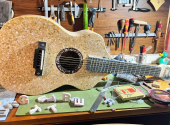
TOP 5 Musician Stereotypes
Today, we will take a look at a few notorious phrases used with equal contempt by either "classical" or "punk" musicians—two irreconcilable music groups. The former have studied at the conservatory or at least a classical music school and can't go without notes, the latter either couldn't or wouldn't attend those famous institutes and "music theory" is a dirty word for them. We all know that the ideal is somewhere in between and there is no point in arguing—but explain that to their outraged egos when they meet in a debate over a beer or, better still, at a band rehearsal.
1. Conservatory will rob you of your talent
This is usually said by those who have never even set foot in the music school in question or by those who suffered during their studies and didn't get good results but for some reason did not have the "balls" to realise what they really wanted and find their own, albeit rather an unorthodox way to music.
Anyway, don't believe a person who says things like: "My friend studied at the conservatory and had to practice scales for so long that he was unable to play a single solo." Scales are usually practised only to the point (and the number of sharps and flats) when one can pass the exams and go for a beer as soon as possible, and a talented player certainly won't lose inspiration for solos because of them. At the most, he will improve his technique and speed of playing and will not have to think long and hard about whether or not the f sharp fits the key of C major.
2. Those who cannot read music are dilettantes
A typical statement of a die-hard "classical musician" who can sight-read even a dreadfully demanding part, graphically resembling spilt tea leaves, but when it comes to the final virtuoso cadenza in a classical instrumental concerto (a solo part unaccompanied by the orchestra where the player has the opportunity to show off his musical qualities), he has to write out and rehearse everything in advance, literally to the last note.
The idea of improvisation or even just controlled aleatoricism, a 20th-century compositional technique more simply described as "freedom within limits" (for example, the graphic score reads: "Play for one minute any note between c1 and f3 in the following tempo"), makes these musicians queasy.
It wouldn't hurt if they went to a jam session once in a while and tried to play their instruments without the sheet music. They'd find that good playing technique can be applied elsewhere than behind the music stand.
3. I don't need music theory or technique
It's basically the opposite of the previous point. You will often hear this statement and others like it ("Music yes, notes no!") from self-taught musicians who are duly proud of their playing abilities which they acquired on the fly and intuitively.
As fans of some subgenres of extreme metal would tell you, the motivation may be to "return to the roots," to create a musical sound outside of the institutionalised music system and to achieve an "authentic" artistic expression. Or perhaps to deliberately trample on and deny this system. This punk approach is often style-forming—through intuitive and untrained use of musical instruments, specific progressions and sounds emerge that often define an entire musical subgenre.
Another version is the musician-monkey (in a good sense of the word) who—without knowing how they do it—can imitate their famous musical models quite accurately and reproduce or accompany a musical motif they have just heard. This is a great and welcome skill and one worth cultivating. But from a certain musical level onwards, it ceases to be sufficient.
All of the above-mentioned can get away with their strategy for quite a long time—until they get to a band where one of their colleagues asks them to count the beats or to be able to omit a specific note in a chord other than the third (which they omit automatically anyway because dealing with the differences between major and minor is lame and power chords are cool). The following communication chaos can seriously screw up an otherwise promising musical collaboration.
4. The more tones there are, the better the music(ian)
Some musicians can't accept that three basic harmonic functions (or in the case of minimalism just one) can be enough to write a good song. Their ears and egos can only be pleased by compositions so rhythmically complex that it takes several semesters of mathematical analysis to find the first beat of the bar, so harmonically imaginative that an altered chord or an abrupt modulation lurks around every corner, and so melodically rich that the tablature resembles a pattern for knitting a Scandinavian jumper with a reindeer motif.
What does it matter that the composer or player is just showing off and the given composition has no deeper thought. After all, the more complex the piece, the greater the art—and the more valuable the player's performance, right?
5. Those who can't do, teach
This is occasionally uttered by someone from both opposing musical camps. For some reason, the teaching profession tends to be looked down upon by many while everybody knows that it is energy-consuming, sometimes unrewarding and often poorly paid.
However, especially in the music field, this statement is completely out of place as many great musicians also teach—at least because they would not earn their bread by playing concerts alone. And there are plenty of great musicians who also want to teach and certainly have something to pass on to their students (see, for example, the following recording of a workshop at Berklee College of Music).
If anything, one could say: "To know how to play doesn't mean to know how to teach." Think back, you might have also come across brilliant, talented and skilled musicians who, even after years of practice and gigging, had no idea how they were actually doing "it" and couldn't summarise and explain their methods to others. A musical virtuoso does not automatically equal a good teacher.
And what "dissing" phrases have you heard from both of these irreconcilable camps? Let us know in the comments!
If you have found an error or typo in the article, please let us know by e-mail info@insounder.org.





